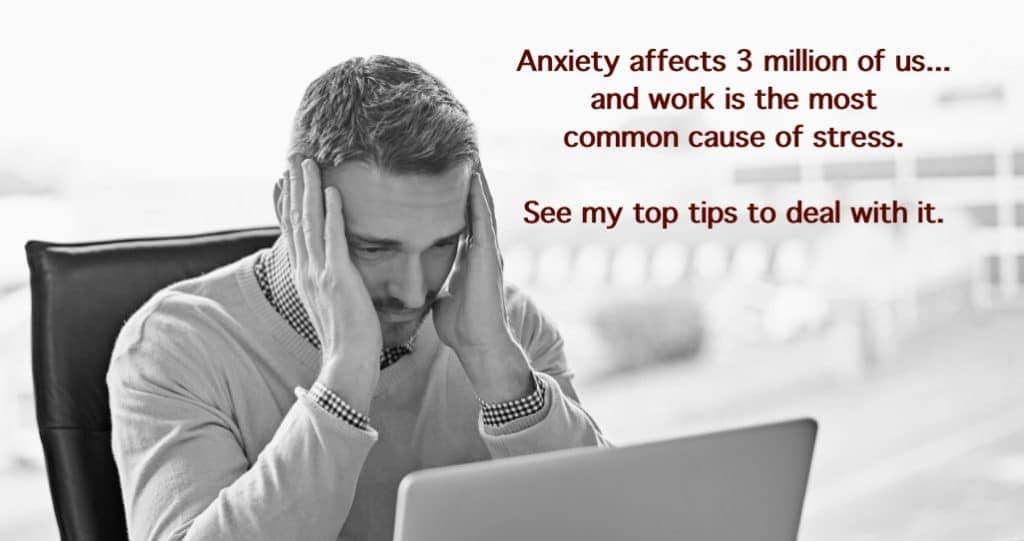Anxiety is very common; 3 million people in the UK have an anxiety disorder. Anxiety is a response to a real or perceived stress or danger. As a threat is identified by the amygdala or ‘fear centre’ in the brain, cortisol is released and adrenalin gets pumped through the body to enable it to cope with danger. The problem is that this response can get out of proportion to the reality of the threat, or can even occur when there is no danger present but just through thought processes.
If the anxiety gets intense, one can experience a panic attack. It’s worth noting how the NHS describe this:
‘A panic attack is a rush of intense anxiety and physical symptoms.
They can be frightening and happen suddenly, often for no clear reason.
You may experience:
- what feels like anirregular or racing heartbeat (palpitations)
- sweating
- trembling
- shortness of breath (hyperventilation)
- a choking sensation
- nausea
- dizziness
- tingling fingers
- ringing in your ears
Some people think they are having a heart attack because it feels like their heart is beating fast or irregularly, or even that they are going to die.
Panic attacks usually last somewhere from 5 to 20 minutes. Although it may feel like something is seriously wrong, they aren’t dangerous and shouldn’t harm you. You won’t usually need to be admitted to hospital if you have had a panic attack.’
So the main points so far are that it’s common, it can create severe physical effects, but that a lot of it is self-generated and may not be proportionate to the reality of a situation. It also doesn’t stay severe for very long.
To get personal, even with decades of mindfulness practice, when too many difficult things happen at once, I can get overloaded. So the trick, in my humble opinion, is to learn what to do with it when it arrives, rather than seek a magic bullet and hope it will go away forever.
So here are my top tips, combining my own experience with that of the best medical advice I can find. I’m not going to pull punches.
- Intention – be clear that you intend to get some calm and clarity back quickly. It can be easy to allow the anxiety to take hold as if nothing can be done, or even in some way to welcome it, and play the victim (sorry if that sounds harsh, but I know it can be true).
- Act now – we’ll look at what to do next. Just don’t roll over feel helpless. This is not a good state, for ourselves or for people around us, and we can act to control it. Don’t wait for circumstances to change or for someone else to save you – believe in your own capacity to deal with it. At least try.
- Avoid it occurring – that’s not helpful advice when you’re suffering anxiety, but if we’re close to the edge already, it may not take much more to push us over. So take your self-care seriously and do what you need to do in your life to reduce the background stress level. It’s your life, and your choices.
- Practice acceptance – this does not mean that we’re passive victims, it means being honest that this thing is here, not running away or pretending otherwise, and doing what you need to do even if you don’t feel like it.
- So here are my top tips when and if it arises:
- Use mindful breathing practices – especially the longer outbreath technique with a smile and with attention on your feet. This can change the body chemistry.
- Use curiosity – step back and observe with interest the feelings, thoughts, and emotions that arise with a little distance. You are not your thoughts.
- Get outside and do some exercise – this can bring down the cortisol that triggers the adrenaline.
- Focus your mind and energy on something or someone else – distraction can get us out of self-obsessed thoughts.
- Employ kindness – for yourself and even better, for others. Act with compassion – it makes us happier.
- And here are my top self-care tips to bring down the background level:
- Stay self-aware – if we regularly check in to our mental health, we can do something preventative before a crisis builds.
- Develop a regular mindfulness practice – it can be more effective than drugs and is recommended by National Institute for Health and Care Excellence (NICE).
- Follow a good diet and focus on the health of the gut biome. Have plenty of fruit and veg, water, and keep caffeine and sugar in control. Some nutritional supplements may be useful.
- Consider a course of drugs (SSRIs) if the anxiety is getting really bad – much as we’d all like to avoid drugs, they have their place. They can give us a window of opportunity to get back to health.
Hoping that helps!
But I better also say: see a doctor if you need to. This is only a set of tips and I’m not medically trained.
